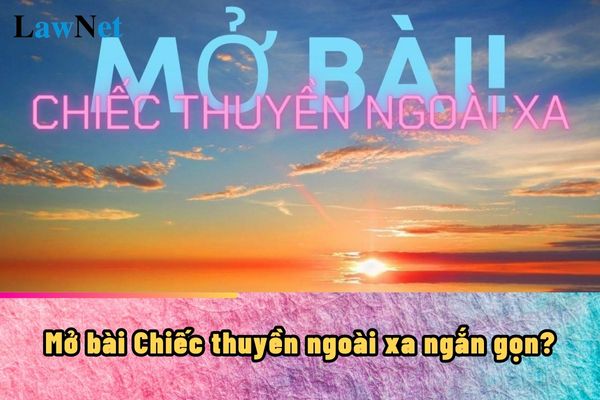What are sample introductory paragraphs for essays on "Chiếc thuyền ngoài xa" for students in Vietnam? What are 5 prohibited acts for grade 12 students in Vietnam?
What are sample introductory paragraphs for essays on "Chiếc thuyền ngoài xa" for students in Vietnam?
Students can refer to following sample introductory paragraphs for essays on "Chiếc thuyền ngoài xa".
|
Introductory paragraphs for essays on "Chiếc thuyền ngoài xa" 5 direct introductory paragraphs:
*Note: The information is only for reference purposes./. |

What are sample introductory paragraphs for essays on "Chiếc thuyền ngoài xa" for students in Vietnam? What are 5 prohibited acts for grade 12 students in Vietnam? (Image from the Internet)
What are the duties of grade 12 students in the educational environment?
Based on Article 34 of the Regulations for lower secondary schools, upper secondary schools, and schools with multiple educational levels issued together with Circular 32/2020/TT-BGDDT, grade 12 students have the following duties when participating in the educational environment:
- Performing the duties of studying and practicing according to the school's educational program and plan.
- Respecting parents, staff, teachers, and other school employees, as well as the elderly; fostering solidarity, helping each other in study and practice; adhering to school regulations and national laws.
- Maintaining physical fitness and personal hygiene.
- Participating in group activities of the school, class, Ho Chi Minh Young Pioneer Organization, Ho Chi Minh Communist Youth Union; helping the family, engaging in social labor and activities, environmental protection, maintaining traffic order and safety.
- Preserving and protecting the school's property, public property; contributing to building, protecting, and promoting the school's traditions.
Additionally, grade 12 students are entitled to the following rights while attending school (based on Article 35 of the Regulations for lower secondary schools, upper secondary schools, and schools with multiple educational levels issued together with Circular 32/2020/TT-BGDDT).
- Entitled to equal access to comprehensive education, ensured conditions regarding time, facilities, hygiene, and safety for classroom study and self-study at home, provided information on their study and practice, and access to school resources and facilities for educational, cultural, sports activities under school regulations.
- Respected and protected, treated with equality and democracy, entitled to lodge complaints with the school and educational authorities concerning decisions affecting themselves; entitled to transfer schools with valid reasons under prevailing regulations; allowed to advance in classes or study beyond the defined age under Article 33 and Article 35 of the aforementioned regulations.
- Participate in activities to develop talents in subjects, sports, and arts organized by the school if conditions permit.
- Receive scholarships or other financial aids as prescribed for students with social policy entitlement, those facing economic difficulties, or students with special talents.
- Transfer schools if meeting conditions as prescribed; school transfer procedures follow regulations by the Minister of Education and Training.
- Enjoy other rights according to the law.
What are 5 prohibited acts for grade 12 students in Vietnam?
Based on Article 37 of the Regulations for lower secondary schools, upper secondary schools, and schools with multiple educational levels issued together with Circular 32/2020/TT-BGDDT, actions prohibited for lower secondary and upper secondary school students include:
(1) Insulting the honor and dignity, physically harming teachers, staff, other school personnel, outsiders, and peers.
(2) Cheating in study, assessments, exams, and admissions.
(3) Buying, selling, using alcohol, beer, cigarettes, addictive substances, stimulants, fireworks, and explosive substances.
(4) Using mobile phones or other devices during classtime when not serving study purposes and not permitted by teachers.
(5) Engaging in fights, disrupting order, and security in schools and public places.
(6) Using or exchanging cultural products with violent or obscene contents; playing with toys or games detrimental to one's healthy development.
(7) Violating other prohibited acts under the law.

